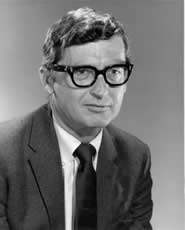

|

|
IN MEMORIAM
Patrick Wilson
Professor in the School of Information Management and Systems, Emeritus
Berkeley
1927—2003
Patrick G. Wilson, librarian and philosopher, was born on December 29, 1927, grew up in Santa Cruz and entered the University of California, Berkeley as a freshman undergraduate in 1945. He received his A.B. degree in philosophy, with highest honors, in 1949, a bachelor of library science degree in 1953, and his Ph.D. in philosophy in 1960. He began working in UC Berkeley’s Doe Library’s general reference service after receiving his degree in library science, and served as a librarian and bibliographer for South Asia Studies from 1954 to 1959.
Wilson taught philosophy at the University of California, Los Angeles starting in 1960, but returned to Berkeley in 1965 as assistant professor in the School of Librarianship, during the Free Speech Movement. He received tenure in 1968, served as dean of the school from 1970 to 1975, and became full professor in July 1976, when the school was renamed the School of Library and Information Studies. Wilson also was acting dean from 1989 until his retirement in 1991. He remained active, reading, writing, and, occasionally, participating in seminars. He died in San Francisco on September 12, 2003, aged 75.
His return to Berkeley, in 1965, as an assistant professor in the School of Librarianship, placed him in a difficult position. University regulations required that his four and a half years as an assistant professor of philosophy at UCLA be included in the countdown to tenure, leaving him a year and a half to justify tenure in a different field on a different campus. His successful response was to write a penetrating, discursive analysis of the nature of bibliography, played out in terms of two fundamentally different roles: the compilation of enumerative, descriptive lists; and an advisory role concerning the best documentary means to some end. Published by the University of California Press in 1968, Two Kinds of Power: An Essay on Bibliographical Control became a classic that is still widely read for its careful exposition of central concepts such as “text” and “relevance.”
His philosophical interests, developed in his doctoral dissertation, "On Interpretation and Understanding" (1960), blended with a concern for practical matters, continued in a landmark paper on the situational nature of relevance ("Situational relevance," Information Processing and Management, [1973]), the relationship between what has been recorded and what anyone actually knows in Public Knowledge, Private Ignorance (1977), and an examination of the reasons why and when people trust what they read, Second-Hand Knowledge: An Inquiry into Cognitive Authority (1983). He also wrote widely on technical aspects of bibliographic control, information overload, intellectual property, and the economics of information services, including an explanation of why attempting to be completely familiar with all the literature on a topic would be economically indefensible.
Wilson was an enthusiastic skeptic. He liked to examine and to question widely held assumptions underlying both academic work and professional practice and his work remains widely accepted as being the best in its field. “Once you have read [Wilson] on key library and information science concepts such as 'relevance,' you realize that you cannot go back to what passes for analysis elsewhere; you are changed,” said Howard D. White, a former Ph.D. student of Wilson’s and himself now a professor emeritus of information science.
In 1991, a conference devoted to Wilson’s work was held in Sweden, and, in 2002, the American Society of Information Science and Technology gave him the Award of Merit, its highest honor. The citation accompanying the award stated that “His writings – graceful, rigorous and not infrequently witty – have centered on the intersection among knowledge, information and human behavior. . . . He combines a penetrating intellect with a remarkably broad and wide-ranging reading of relevant material. . . . [His three books] represent the most penetrating investigation of fundamental ideas in information science that anyone has yet undertaken.”
He was dean at a time when the school was increasingly concerned with computers, with library automation, and online searching. He did much to help modernize and generalize the school’s curriculum and scope during its transformation from School of Librarianship into the School of Library and Information Studies and the basis for the present School of Information Management and Systems.
As a teacher and as a colleague he was exceptional in his willingness to review other people’s manuscripts promptly and flair for making insightful comments on them.
Wilson died in a nursing home following months of poor health. A lively oral history entitled Philosopher of Information: An Eclectic Imprint on Berkeley's School of Librarianship, 1965-1991, was completed not long before he died and is available in The Bancroft Library and online. His survivors include a brother, Thomas D. Wilson, of Fairfax, California, two nieces and two nephews. A campus memorial service was held on October 29, 2003.
Michael K. Buckland
Michael D. Cooper
Robert D. Harlan
Nancy A Van House